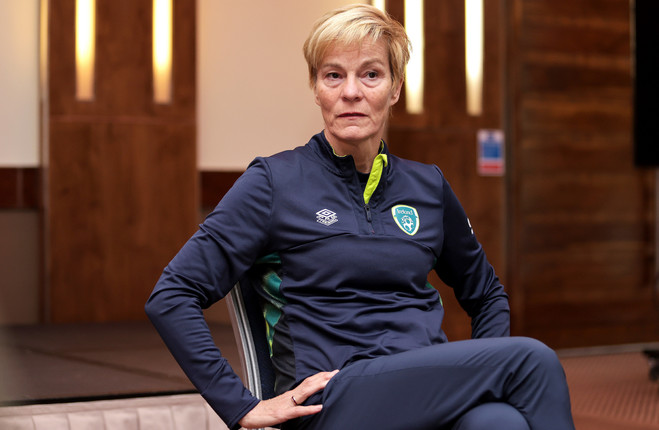IRELAND BOSS Vera Pauw says the team would be open to playing at the Aviva Stadium as part of their World Cup preparations.
With Tallaght Stadium set to be under reconstruction for a period, the Irish team are set to move away from their traditional home, at least temporarily.
Asked whether a big game against a country of England’s calibre could be arranged for the Aviva, she replied: “England at the end phase. We need to build it up like we did last year, we built up our resistance and hopefully, we can do that next year too.”
She continued: “If we can fill the Aviva then I’m more than happy to play at the Aviva because we have qualified now.
“We will go wherever, Tallaght is not available because of the construction. Tallaght will always be our home ground but it’s now time to look at other options, also go through the country, maybe, if that is possible, to show ourselves to other areas of Ireland.”
The Dutch coach also hinted at extending her current Ireland contract beyond the summer, explaining private factors would influence the decision while adding “it is very clear my heart is lying here”.
There was also one other issue the 59-year-old coach was especially keen to address.
Some important squad members missed the Scotland game due to injury, including Savannah McCarthy (knee), Ruesha Littlejohn (foot), Megan Connolly (ribs), Ellen Molloy (knee), Jessica Ziu (knee), Leanne Kiernan (ankle) and Aoife Colvill (knee).
Pauw was asked specifically about two of Ireland’s most promising talents in Molloy and Abbie Larkin, which prompted her into a broader discussion on player injuries and her frustration with certain individuals’ handling of her players’ training loads at club level.
The Irish boss also suggested that at least one of the people involved in such decisions behind the scenes lacked the correct appreciation of the training required to be a footballer.
“If as a rugby expert into football and you put the players under rugby training sessions, that is your expertise, you do not make the analysis of the game first. And the analysis of the game is that we have to train recovery because it’s about the number of explosive actions for their match in football. So to make a very complicated issue understandable, if you train on squats, you train big muscle groups. As soon as you have a disbalance between your core stability muscle groups and the big muscle groups that then take over your core stability, you will get problems as soon as your nerve system gets fatigued. And whatever title they have, if they do not analyse the game and know what the demands are on the players, put programmes on players that are meant for rugby, you have to go back to school first before you ruin more players.”
Pauw also rejected any suggestion that such problems were influenced by the number of games that individuals are required to play.
“I worked with Houston Dash in a programme where there were two-to-three games a week with zero injuries. But you have to know what you’re doing. I have coaches saying to me: ‘Who are you to say something like this? That’s the doctor’s responsibility.’ As if the doctor is specialised in training methods. So that is the response I receive.
“I’ve even had a general manager writing to our CEO saying a player did not run 24km at the weekend so that she wasn’t loaded when she was coming back to the club. Well, if you say that a player needs to run 24km a week, then you have no idea what you’re talking about because it’s about the number of explosive actions.
“So if you make 10 explosive actions in 10 minutes and you need to make 20 at a higher level, your recovery needs to come straight away so you have to train recovery, not building muscle because that is not recovery training.
“If you take a nine-year-old, eight-year-old, 10-year-old and their game, and you calculate to the big game, the child will run as much as the top player. But if you count the number of explosive actions, then there’s a huge difference, also within the levels of Premier League, First Division, and Second Division. That is where the difference is.
“So you need to train recovery. And if you put players on squats or heavy weights in every training session, you do not know what you are doing and you really need to analyse the game first — that is why we have so many injuries, apart from the knocks of Megan and Ruesha, which have nothing to do with it.”

